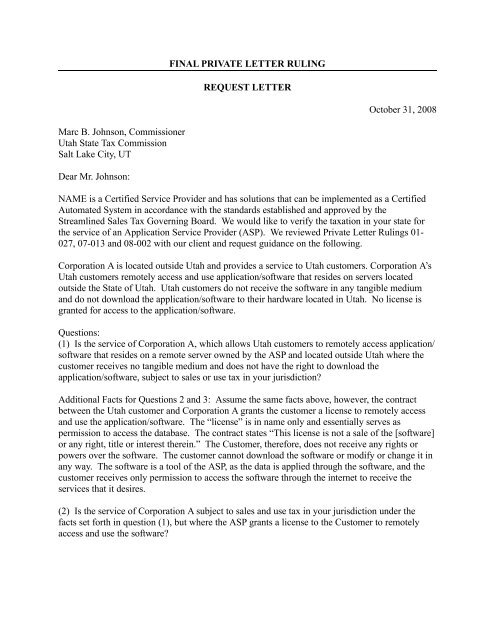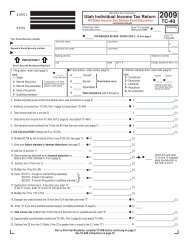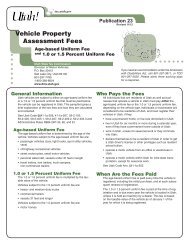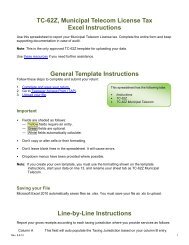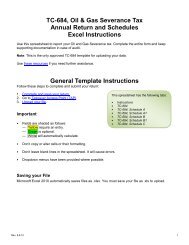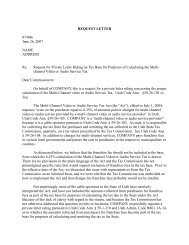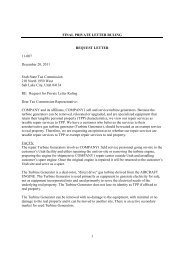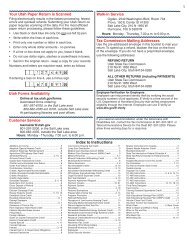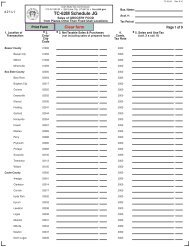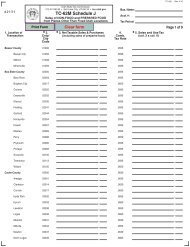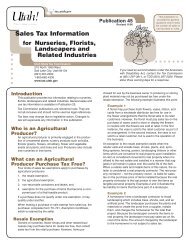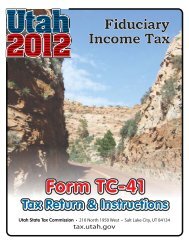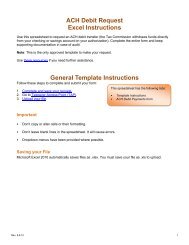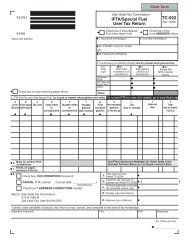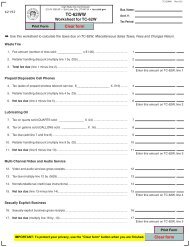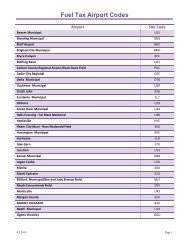Private Letter Ruling 08-012 - Utah State Tax Commission
Private Letter Ruling 08-012 - Utah State Tax Commission
Private Letter Ruling 08-012 - Utah State Tax Commission
Create successful ePaper yourself
Turn your PDF publications into a flip-book with our unique Google optimized e-Paper software.
Marc B. Johnson, <strong>Commission</strong>er<br />
<strong>Utah</strong> <strong>State</strong> <strong>Tax</strong> <strong>Commission</strong><br />
Salt Lake City, UT<br />
Dear Mr. Johnson:<br />
FINAL PRIVATE LETTER RULING<br />
REQUEST LETTER<br />
October 31, 20<strong>08</strong><br />
NAME is a Certified Service Provider and has solutions that can be implemented as a Certified<br />
Automated System in accordance with the standards established and approved by the<br />
Streamlined Sales <strong>Tax</strong> Governing Board. We would like to verify the taxation in your state for<br />
the service of an Application Service Provider (ASP). We reviewed <strong>Private</strong> <strong>Letter</strong> <strong>Ruling</strong>s 01-<br />
027, 07-013 and <strong>08</strong>-002 with our client and request guidance on the following.<br />
Corporation A is located outside <strong>Utah</strong> and provides a service to <strong>Utah</strong> customers. Corporation A’s<br />
<strong>Utah</strong> customers remotely access and use application/software that resides on servers located<br />
outside the <strong>State</strong> of <strong>Utah</strong>. <strong>Utah</strong> customers do not receive the software in any tangible medium<br />
and do not download the application/software to their hardware located in <strong>Utah</strong>. No license is<br />
granted for access to the application/software.<br />
Questions:<br />
(1) Is the service of Corporation A, which allows <strong>Utah</strong> customers to remotely access application/<br />
software that resides on a remote server owned by the ASP and located outside <strong>Utah</strong> where the<br />
customer receives no tangible medium and does not have the right to download the<br />
application/software, subject to sales or use tax in your jurisdiction?<br />
Additional Facts for Questions 2 and 3: Assume the same facts above, however, the contract<br />
between the <strong>Utah</strong> customer and Corporation A grants the customer a license to remotely access<br />
and use the application/software. The “license” is in name only and essentially serves as<br />
permission to access the database. The contract states “This license is not a sale of the [software]<br />
or any right, title or interest therein.” The Customer, therefore, does not receive any rights or<br />
powers over the software. The customer cannot download the software or modify or change it in<br />
any way. The software is a tool of the ASP, as the data is applied through the software, and the<br />
customer receives only permission to access the software through the internet to receive the<br />
services that it desires.<br />
(2) Is the service of Corporation A subject to sales and use tax in your jurisdiction under the<br />
facts set forth in question (1), but where the ASP grants a license to the Customer to remotely<br />
access and use the software?
(3) Is the service of Corporation A subject to sales and use tax in your jurisdiction under the<br />
facts set forth in question (2) but where the license is specifically granted for no charge or<br />
consideration?<br />
Analysis:<br />
Based on our review of your laws and regulations we believe number 1 would not be subject to<br />
tax in your jurisdiction and need your guidance on numbers 2 and 3.<br />
Thank you for your assistance in this matter.<br />
Sincerely,<br />
NAME<br />
V.P. Government Relations<br />
2 ND NAME<br />
Director of <strong>Tax</strong> Research<br />
COMPANY
NAME<br />
2 ND NAME<br />
RESPONSE LETTER<br />
January 21, 2009<br />
RE: <strong>Private</strong> <strong>Letter</strong> <strong>Ruling</strong> Request—Sales <strong>Tax</strong> Treatment of Services Provided by Corporation<br />
A to <strong>Utah</strong> Customers.<br />
Dear Mr. NAME and Mr. 2 ND NAME:<br />
Your company, COMPANY, has requested a ruling for its client (“Corporation A”) as to<br />
the sales tax treatment of Corporation A’s services involving an Application Service Provider<br />
(“ASP”). COMPANY stated that it has reviewed <strong>Private</strong> <strong>Letter</strong> <strong>Ruling</strong>s (“PLR’s”) 01-027, 07-<br />
013, and <strong>08</strong>-002 with Corporation A. Corporation A is located outside of <strong>Utah</strong> and provides a<br />
service to <strong>Utah</strong> customers. The <strong>Utah</strong> customers of Corporation A remotely access and use an<br />
application/software that resides on the ASP’s servers located outside of <strong>Utah</strong>. The software is a<br />
tool of the COMPANY because data is applied through the software and the customer can only<br />
access the software through the internet to receive the service. <strong>Utah</strong> customers do not receive the<br />
software in any tangible medium and do not download the application/software to their hardware<br />
located in <strong>Utah</strong>. For this PLR, COMPANY asks three specific questions. For the first question,<br />
no license is granted to the customer for access to the application/software. COMPANY asks:<br />
(1) Is the service of Corporation A, which allows <strong>Utah</strong> customers to remotely<br />
access application/software that resides on a remote server owned by the<br />
COMPANY and located outside <strong>Utah</strong> where the customer receives no tangible<br />
medium and does not have the right to download the application/software, subject<br />
to sales or use tax in your jurisdiction?<br />
For the next two questions, COMPANY proposes additional facts in which the COMPANY<br />
confers a license to the customer. The license is part of the contract between Corporation A and<br />
the <strong>Utah</strong> customer and grants the customer permission to remotely access and use the<br />
application/software. The contract states: “This license is not a sale of the [software] or any<br />
right, title or interest therein.” COMPANY provides that the customer does not receive any<br />
rights or powers over the software and the customer cannot download the software or modify or<br />
change it in any way. COMPANY specifically asks:<br />
(2) Is the service of Corporation A subject to sales and use tax in your jurisdiction<br />
when the ASP grants a license to the customer to remotely access and use the<br />
software?
and<br />
(3) Is the service of Corporation A subject to sales and use tax in your jurisdiction<br />
where the license is specifically granted for no charge or consideration?<br />
Applicable Law<br />
<strong>Utah</strong> Code Ann. § 59-12-103 imposes a sales tax on certain transactions involving<br />
tangible personal property, as set forth below in pertinent part:<br />
(1) A tax is imposed on the purchaser as provided in this part for amounts paid<br />
or charged for the following transactions…<br />
(a) retail sales of tangible personal property made within the state…<br />
(k) amounts paid or charged for leases or rentals of tangible personal<br />
property if within this state the tangible personal property is:<br />
(i) stored;<br />
(ii) used; or<br />
(iii) otherwise consumed;<br />
(l) amounts paid or charged for tangible personal property if within<br />
this state the tangible personal property is:<br />
(i) stored;<br />
(ii) used; or<br />
(iii) consumed . . .<br />
<strong>Utah</strong> Code Ann. § 59-12-103 (effective January 1, 2009) clarifies through subsection (n)<br />
that sales tax is imposed on certain transactions involving products transferred electronically,<br />
stating:<br />
(1) A tax is imposed on the purchaser as provided in this part for amounts paid<br />
or charged for the following transactions…<br />
(n) amounts paid or charged for a sale:<br />
(i) (A) of a product that:<br />
(I) is transferred electronically; and<br />
(II) would be subject to a tax under this chapter<br />
if the product was transferred in a manner<br />
other than electronically; or<br />
(B) of a repair or renovation of a product that:<br />
(I) is transferred electronically; and<br />
(II) would be subject to a tax under this chapter<br />
if the product was transferred in a manner<br />
other than electronically; and<br />
(ii) regardless of whether the sale provides:
(A) a right of permanent use of the product; or<br />
(B) a right to use the product that is less than a<br />
permanent use, including a right:<br />
(I) for a definite or specified length of time; and<br />
(II) that terminates upon the occurrence of a<br />
condition.<br />
<strong>Utah</strong> Code Ann. § 59-12-102(97) (effective until January 1, 2009) defines “tangible<br />
personal property” to include prewritten computer software, stating:<br />
(a) “Tangible personal property” means personal property that:<br />
(i) may be:<br />
(A) seen;<br />
(B) weighed;<br />
(C) measured;<br />
(D) felt; or<br />
(E) touched; or<br />
(ii) is in any manner perceptible to the senses.<br />
(b) “Tangible personal property” includes:<br />
(i) electricity;<br />
(ii) water;<br />
(iii) gas;<br />
(iv) steam; or<br />
(v) prewritten computer software.<br />
<strong>Utah</strong> Code Ann. § 59-12-102(1<strong>08</strong>) (effective January 1, 2009) modifies “tangible<br />
personal property” to exclude a product transferred electronically. Subsection (c) provides:<br />
(c) “Tangible personal property” does not include a product that is transferred<br />
electronically.<br />
Therefore under § 59-12-102(1<strong>08</strong>) (effective January 1, 2009), prewritten computer<br />
software that is transferred electronically will be excluded from “tangible personal<br />
property” and no longer taxed under §59-12-103(1)(a), (k) and (l). Rather, prewritten<br />
computer software that is transferred electronically will be taxed under § 59-12-103(1)(n)<br />
as a product transferred electronically.<br />
<strong>Utah</strong> Code Ann. § 59-12-102(83) (effective until January 1, 2009) and § 59-12-102(94)<br />
(effective January 1, 2009) define “sale,” as set forth below:<br />
(a) “Sale” means any transfer of title, exchange, or barter, conditional or<br />
otherwise, in any manner, of tangible personal property or any other<br />
taxable transaction under Subsection 59-12-103(1), for consideration.
(b) “Sale” includes:<br />
(i) installment and credit sales;<br />
(ii) any closed transaction constituting a sale;<br />
(iii) any sale of electrical energy, gas, services, or entertainment taxable<br />
under this chapter;<br />
(iv) any transaction if the possession of property is transferred but the<br />
seller retains the title as security for the payment of the price; and<br />
(v) any transaction under which right to possession, operation, or use<br />
of any article of tangible personal property is granted under a lease<br />
or contract and the transfer of possession would be taxable if an<br />
outright sale were made.<br />
<strong>Utah</strong> Code Ann. § 59-12-102(68) (effective until January 1, 2009) and § 59-12-102(77)<br />
(effective January 1, 2009) define “prewritten computer software” as follows:<br />
(a) Except as provide in Subsection (68)(b)(ii) or (iii), “prewritten computer<br />
software” means computer software that is not designed and developed:<br />
(i) by the author or other creator of the computer software; and<br />
(ii) to the specifications of a specific purchaser.<br />
Prewritten software is further defined in subsections (b) and (c) of § 59-12-102(68) and in<br />
<strong>Utah</strong> Admin. Code R865-19S-92. However, whether the software is prewritten is not at<br />
issue in this case.<br />
<strong>Utah</strong> Admin. Code R865-19S-92(B) (“Rule 92B”) provides:<br />
The sale, rental or lease of prewritten computer software constitutes a sale of<br />
tangible personal property and is subject to the sales or use tax regardless of the<br />
form in which the software is purchased or transferred.<br />
Under Rule 92B, the form in which the software is purchased or transferred is irrelevant.<br />
PLR’s 07-013, 01-027, and <strong>08</strong>-002 analyze the sales tax treatment of transactions<br />
involving computer software. In PLR 07-013, a <strong>Utah</strong> company provided customers with a<br />
backup and recovery service. Connected with this service, the company provided its customers<br />
with prewritten computer software that allowed the customers to select the files to be backed up<br />
and to set certain parameters. The software was useless without the backup service. To provide<br />
this service, the company temporarily stored the customers’ files on the company’s servers. The<br />
<strong>Commission</strong> found that, under the primary object or essence of the transaction test, the company<br />
was primarily providing a backup service, not a product. Likewise, the <strong>Commission</strong> found that<br />
the software was merely incidental to providing the backup service and that the software was<br />
consumed by the company. Furthermore, the <strong>Commission</strong> found that the company’s servers<br />
were not leased to its customers because the true object of the transaction for the customers was<br />
not the acquisition of storage space. The servers were not necessary for the customers to conduct<br />
all of their normal operations.
In PLR 01-027, a company sold licenses to its content software and its content database.<br />
The <strong>Commission</strong> found that the content software and content database were prewritten computer<br />
software. If that software was delivered by disk or electronic means to a <strong>Utah</strong> customer such that<br />
the customer possessed the software or the software resided on the customer’s computer, then<br />
that software was taxable. If a customer merely viewed a database without downloading it, the<br />
customer was not in possession of the software. Additionally, a customer would possess the<br />
software if the software was downloaded onto a server located in <strong>Utah</strong> and the customer was<br />
considered to be renting or leasing that server. If the server were located outside of <strong>Utah</strong>, the<br />
customer would not possess the software in <strong>Utah</strong> and the sale of the software would not be<br />
taxable in <strong>Utah</strong>.<br />
In PLR <strong>08</strong>-002, a <strong>Utah</strong> corporation provided its customers with the use of prewritten<br />
computer software that resided on the corporation’s servers located in <strong>Utah</strong>. The corporation<br />
charged a Base Service fee for the customers’ right to use the prewritten software and for the<br />
Corporation’s commitment to maintain, backup, and provide the customers continuous access to<br />
the base software and the customers’ databases on the corporation’s servers. The <strong>Commission</strong><br />
found that the customers leased the corporations’ servers, stating:<br />
[The corporation’s] customers create databases using the [] software. These<br />
databases are stored on servers maintained by [the corporation], and located in the<br />
<strong>State</strong> of <strong>Utah</strong>. While the customers are not allocated a specific server, or portion<br />
of that server, the <strong>Commission</strong> has previously determined that such circumstances<br />
constitute a lease of tangible personal property. Therefore, the <strong>Commission</strong> finds<br />
that the hosting of the software and customer databases by [the corporation] is<br />
also taxable as a “lease” or “rental” of server space.<br />
The <strong>Commission</strong> also found that the corporation sold the prewritten computer software to the<br />
customers, stating:<br />
There is no doubt that [the corporation]’s customer received the “right to…use of<br />
[an] article of tangible personal property” under their contracts. Similarly, there<br />
seems to be no question that if the customer took possession of the software and<br />
utilized it on their server, it would be a taxable transaction as the sale of tangible<br />
personal property.<br />
Therefore, the <strong>Commission</strong> found that the Base Service fee charged by the <strong>Utah</strong> corporation for<br />
the customers’ use of the software on the servers in <strong>Utah</strong> was subject to <strong>Utah</strong> sales tax.<br />
Analysis<br />
As explained below, Corporation A’s services, as described in this PLR, are not subject to<br />
<strong>Utah</strong> sales tax, regardless of whether the ASP merely provides <strong>Utah</strong> customers with remote<br />
access to the application /software on the server located out of state or the ASP additionally<br />
grants a license to the <strong>Utah</strong> customers giving permission for remote access to the software on the<br />
server located out of state.
In the current situation, Corporation A is primarily providing access to and use of the<br />
prewritten computer software located on the ASP servers. The software involved is not merely<br />
incidental to the services of Corporation A. PLR 07-013 does not apply because it is<br />
distinguishable from the present situation. In PLR 07-013, the <strong>Commission</strong> found that the<br />
primary object or essence of the transaction was to provide a backup service, not to provide the<br />
software. In the current situation, the primary object or essence is to provide the software. 1<br />
<strong>Utah</strong> law imposes a sales tax on the sale of tangible personal property made within the<br />
state. See § 59-12-103 (1)(a), (k) and (l). Also, <strong>Utah</strong> law imposes a sales tax on the sale of a<br />
product that is transferred electronically if that product would have been subject to tax had that<br />
product been transferred in a manner other than electronically. See § 59-12-103(1)(n)(effective<br />
January 1, 2009). Before January 1, 2009, prewritten computer software transferred<br />
electronically was included in the definition of tangible personal property ( see §59-12-102(97)<br />
(effective until January 1, 2009)) and was taxable under § 59-12-103 (1)(a), (k), and (l). After<br />
January 1, 2009, prewritten computer software transferred electronically will be excluded from<br />
the definition of tangible personal property ( see § 59-12-102(1<strong>08</strong>)(c) (effective January 1, 2009))<br />
and will be taxable under § 59-12-103(1)(n). Basically, the tax treatment of prewritten computer<br />
software transferred electronically remains the same both before and after January 1, 2009; a sale<br />
of such is subject to tax if the sale is made within the state. In this case, Corporation A sold<br />
computer software transferred electronically, which sales may be taxable by <strong>Utah</strong> if the sales<br />
were made within <strong>Utah</strong>.<br />
By definition, prewritten computer software is not designed and developed by the author<br />
“to the specifications of a specific purchaser.” See §59-12-102(68) (effective until January 1,<br />
2009) and § 59-12-102(77) (effective January 1, 2009). In this case, the software is very likely<br />
to be prewritten; no facts suggest otherwise.<br />
“Sale” is defined as “any transfer of title, exchange, or barter, conditional or otherwise, in<br />
any manner, of tangible personal property or any other taxable transaction under Subsection 59-<br />
12-103(1), for consideration.” <strong>Utah</strong> Code Ann. § 59-12-102(83) (effective until January 1, 2009)<br />
and § 59-12-102(94) (effective January 1, 2009). Furthermore, a “sale” specifically includes<br />
“any transaction under which right to possession, operation, or use of any article of tangible<br />
personal property is granted under a lease or contract and the transfer of possession would be<br />
taxable if an outright sale were made.” Under Rule 92B, “[t]he sale, rental or lease of prewritten<br />
computer software . . . is subject to the sales or use tax regardless of the form in which the<br />
software is purchased or transferred.” In this case, Corporation A sold the prewritten computer<br />
software because the customers received the “right to…use of [an] article of tangible personal<br />
property” under their contracts. In your request letter, you provide that “[t]he <strong>Utah</strong> customers of<br />
1 On the other hand, if the primary object of the transaction of Corporation A is to offer services<br />
other than providing access to the software and if the software is just a tool of the ASP, then PLR<br />
07-013 may apply. In PLR 07-013, the software provider was the consumer of the software, not<br />
the customers. Likewise if the software were just a tool of the ASP, then the ASP would be the<br />
consumer of the software, not Corporation A or its <strong>Utah</strong> customers. Additionally, the ASP would<br />
be consuming that software out of state, on its servers located outside of <strong>Utah</strong>, so the software<br />
would not be subject to <strong>Utah</strong> sales tax.
Corporation A remotely access and use an application/software that resides on the ASP’s<br />
servers . . .” The main issue for this PLR is whether the sale of the prewritten computer<br />
software occurs in <strong>Utah</strong>.<br />
PLR’s 01-027 and <strong>08</strong>-002 discuss situations in which customers remotely access and use<br />
an application or software. In PLR 01-027, the <strong>Commission</strong> advised that a customer would<br />
possess prewritten computer software if the software were downloaded and at least temporarily<br />
resided on the customer’s computer. The customer would not possess the software if the<br />
“customer goes to an Internet site to view a database without downloading the []software [] on<br />
his or her own computer . . .” It is clear from this statement that the mere viewing of a program<br />
or database without downloading does not create possession. However, the customer would<br />
possess the software if it were downloaded onto a server that the customer was considered to be<br />
renting or leasing. If that server was located in <strong>Utah</strong>, then the customer would possess the<br />
software in <strong>Utah</strong> and the sale of the software would be taxable by <strong>Utah</strong>. If the server were not in<br />
<strong>Utah</strong>, then the transaction would not be taxable by <strong>Utah</strong>. The logic of PLR 01-027 is consistent<br />
with PLR <strong>08</strong>-002. In PLR <strong>08</strong>-002, for a Base Service fee, the corporation sold the remote use of<br />
its prewritten computer software on its servers located in <strong>Utah</strong>, the corporation promised to<br />
provide customers continuous access to those servers, and the corporation to provided related<br />
backup and maintenance services for the customers’ files. In that case, the <strong>Commission</strong> found<br />
that the sale of the prewritten software and use of the servers were taxable by <strong>Utah</strong>.<br />
In this present situation, similar to PLR’s 01-027 and <strong>08</strong>-002, Corporation A sells the<br />
prewritten computer software, which its customers access remotely. Following the logic of PLR<br />
01-027, Corporation A’s customers possess the software when the software is downloaded onto<br />
the ASP server, which the customers are leasing. However, because the ASP’s server is not<br />
located in <strong>Utah</strong>, the customers do not possess the software in <strong>Utah</strong> and the sales transactions are<br />
not taxable by <strong>Utah</strong>. The customers’ remote access of the software without downloading the<br />
software onto a computer located in <strong>Utah</strong> does not create possession of the software in <strong>Utah</strong>.<br />
Instead, such access is akin to merely going to an internet site and viewing a database without<br />
downloading the software, as discussed in PLR 01-027. PLR <strong>08</strong>-002 is clearly distinguishable<br />
from the present case because the servers for PLR <strong>08</strong>-002 were located in <strong>Utah</strong> while the service<br />
in this case is not. In PLR <strong>08</strong>-002, because the servers with the software were located in <strong>Utah</strong>,<br />
the Base Service fee was taxable. In the present case, because the server is located outside of<br />
<strong>Utah</strong>, Corporation A’s services are not taxable by <strong>Utah</strong>. Basically, this factual difference of the<br />
servers’ locations throws the current situation outside the imposition of the tax that occurred in<br />
PLR <strong>08</strong>-002.<br />
The taxability of the software on the ASP’s servers would not change regardless of<br />
whether the ASP grants a license. There is no difference as long as the software is not<br />
transferred or downloaded onto the customer’s hardware located in <strong>Utah</strong>.<br />
Conclusion<br />
Based on the above analysis, Corporation A’s services that involve granting access to the<br />
software located on the ASP’s server located outside of <strong>Utah</strong> are not subject to <strong>Utah</strong> sales tax.<br />
Our conclusions are based on the facts as described. Should the facts be different, a different
conclusion may be warranted. If you feel we have misunderstood the facts as you have<br />
presented them, if you have additional facts that may be relevant, or if you have any other<br />
questions, please contact us.<br />
MBJ/aln<br />
<strong>08</strong>-<strong>012</strong><br />
For the <strong>Commission</strong>,<br />
Marc B. Johnson<br />
<strong>Commission</strong>er


